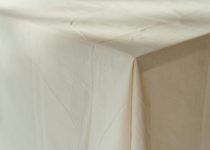Is Polyester Good For Patio Umbrella?
At some point in time, we’ve all been faced with the dilemma of what kind of umbrella to buy. Do you go for the traditional cotton or switch it up with a polyester umbrella?
In this blog post, we’ll explore the pros and cons of both materials to help you make an informed decision when purchasing your next patio umbrella.
What is Polyester material?
Polyester is a category of polymers that contain the ester functional group in every repeat unit of their main chain. As a specific material, it most commonly refers to a type called polyethylene terephthalate (PET), formed by condensation polymerization of ethylene glycol and terephthalic acid. Polyesters include naturally occurring chemicals, such as in the cutin of plant cuticles, as well as synthetics such as nylons and aramids (such as Kevlar).
They are generally based on aliphatic hydrocarbons, and can be aliphatic-aromatic copolyesters (AAC) or aliphatic-aromatic-aliphatic terpolyesters (AAAT or AAT).
In textile applications, polyester is used in fabrics, fibres, threads, ropes, webs and strapping. Polyester fibers are used as filling yarns, common in blankets and upholstery fabric. Polyester fibers are sometimes used in carpets as well.
Polyester fabrics are often made with various kinds of fiberglass reinforcement for garments like jackets or suits. Specialists in environmental chemistry show that PES is a more environmentally friendly fiber than wool or cotton.
Pros of Polyester patio umbrellas
- Polyester patio umbrellas are more durable than cotton patio umbrellas.
- They don’t wrinkle easily, which means they’ll look good for longer.
- They’re resistant to stains and fading, so they’ll stay looking new for longer.
Cons of Polyester patio umbrellas
- Polyester patio umbrellas can be more expensive than cotton patio umbrellas.
- They’re not as breathable as cotton patio umbrellas, so they may be less comfortable in hot weather.
- They can be more difficult to clean than cotton patio umbrellas.
Is it good for Patio umbrellas?
Overall, polyester patio umbrellas are a good choice if you’re looking for a durable, long-lasting umbrella. However, they may not be the best choice if you’re looking for a breezy, cooling umbrella in hot weather. Cotton patio umbrellas are a better option for those situations.
What materials are patio umbrellas made of?
Umbrella fabric is a term used to refer to the type of material used in umbrella canopies. The fabric is designed to be waterproof, preventing rain from seeping through and dripping on you. Making umbrellas with better fabric can ensure greater longevity, as it can prevent wear and tear, especially in areas where rainfall is common.
Typically, modern-day umbrellas use Pongee fabric material for the canopy because it’s lightweight and durable. However, nylon is sometimes used too, although it’s more expensive than Pongee. Canopy fabric has to be waterproof in order to protect users from adverse weather conditions. A good canopy is essential for an umbrella’s durability and longevity. It prevents water from seeping through the umbrella and dripping on its user.
Ribs are typically made from steel or fibreglass because they require durability. These provide structural support for the umbrella during use and ensure that it doesn’t collapse easily under pressure. Teflon coating is sometimes applied on the ribs so that they slide smoothly against each other when opened.*
Which patio umbrella is better nylon or polyester?
There are many different types of patio umbrellas on the market. Sunbrella fabric is a type of polyester material that is used in some patio umbrellas. Nylon fabric is also a type of polyester used in some patio umbrellas. This can make it difficult for consumers to determine which one is better.
For the most part, there is no difference in quality between fabrics. In terms of durability and longevity, Nylon and Polyester offer similar results. Most people will not notice a difference between these fabrics unless they are specifically looking for it.
The main difference between them has to do with the texture and feel of each fabric. Nylon fabric feels more like cotton, and does not have a slick or glossy finish, making it more comfortable under bare feet than polyester.
Polyester products are more suited for commercial usage as they are easier to clean due to their smooth texture and feel. For example, if you are planning on using your patio umbrella regularly, you will want to purchase an umbrella made out of polyester because it will be easier to clean if it gets dirty or stained.*
Which patio umbrella is better, a cotton or polyester one?
Cotton and Polyester are both types of fabrics used to make Patio Umbrellas.
Polyester is more durable than Cotton and does not wrinkle as easily. It is also resistant to stains and fading which means it will look new for longer. However, Polyester Patio Umbrellas can be more expensive than Cotton ones and they are not as breathable as Cotton, making them less comfortable in hot weather.
Cotton Patio Umbrellas are more breathable than Polyester ones and are a better option for those living in a hot climate. They are also less expensive than Polyester patio umbrellas. However, they are not as durable as Polyester patio umbrellas and can wrinkle easily.
What is the best material for patio umbrella?
Patio umbrellas are typically made of a variety of materials, the most common being cotton, nylon or polyester.
Each of these materials has its own benefits and drawbacks. For example, cotton patio umbrellas are more breathable than nylon or polyester patio umbrellas, but they are not as durable. Nylon and polyester patio umbrellas are more durable than cotton ones, but they can be less comfortable in hot weather.
Ultimately, the best material for a patio umbrella depends on the individual’s needs and preferences.
Are polyester patio umbrellas waterproof?
Yes, polyester patio umbrellas are typically waterproof. This is because they are made of a material that is specifically designed to be water resistant. However, it is important to note that not all patio umbrellas are created equal and some may be more waterproof than others.
It is always best to check the specifications of the patio umbrella before purchasing it to ensure that it will meet your needs.
Is polyester cooler than nylon?
Many people wonder if a polyester patio umbrella is cooler than a nylon one. Polyester is a synthetic fiber; nylon is man-made fibers made from petroleum. Polyester fabric is made by extruding the melted polymer through spinneretts.
The result is a fabric that is glossy and fibers that are long, straight, and smooth.
When to use each type?
Nylon umbrellas are best for areas with salt spray. If you live near a beach or ocean and want to protect your patio furniture from harsh weather, then a nylon umbrella will work best for you.
Polyester umbrellas are better for dry climates. If you live in an area where rainfall is relatively low and temperatures are warm, then a polyester umbrella will be easier to maintain because it will be less likely to fade in the sunlight.
It should be noted that both types of umbrellas can be used in either climate if they are properly maintained and cleaned on a regular basis.
Conclusion
In conclusion, patio umbrellas can be made from different types of materials. While cotton patio umbrellas may be breathable in hot weather, they may not last as long. Polyester patio umbrellas may be more durable and easier to clean than cotton patio umbrellas but don’t provide much ventilation.
Overall if you’re looking for a patio umbrella that’s easy to maintain with a long lifespan, then polyester patio umbrellas would probably work best for you on your patio!



